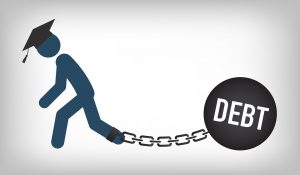The Ultimate Cheat Sheet on Student Loans
The price for higher education is rising, as is the numbers on student loan debt. What is deemed necessary to be successful in today’s world, is also what is holding many folks back from financial freedom. While many are trying to get ahead in their lives, student debt is following them everywhere and it can be hard to know what the next step is.
According to the Board of Governors of the Federal Reserve system, the average monthly student loan payment is $351 for people between the ages of 20-30. All in all, there are 44.2 million American’s with student loan debt. Can you imagine what happens to those that fall behind on something as serious as a student loan? If you have been in this position, you know how seriously those loans have an impact on your day to day life. Working with over 30,000 clients, we see our fair share of student loans and the impact they have on a consumers credit scores. So what can be done?

I’ve been sent to collections, now what?
If you have been sent into collections understand that the government has a lot of power when it comes to student loans and grants. They can garnish your wages, take social security benefits and charge very high collection fees. There is no limit for a collection of federal student loans. Once you miss your payment, they will immediately contact you and the tactics will worsen the longer it takes you to pay. There are severe consequences if you default so pay close attention to your loans. The government hires private collection agencies to collect and many of those agencies will try to collect in illegal, and unprofessional ways. You have rights! We recommend if you have felt harassed or threatened by these collection agencies, that you contact an attorney with Credit Law Center right away.
Should I rehab or consolidate?
Rehabbing your student loan means you spend 9-10 months making payments so that you can remove the default status. If you successfully rehab your student loans the loan holder will remove your default from the credit report. If you consolidate, that negative history for the old loan will continue to show until it ages off the report. You will have a current on the new consolidate loan so continue to make timely payments moving forward. No matter what, student loans need to be paid on time. Maintaining good credit is vital so continue to check your credit report often using a credit monitoring system.
Remember, it is best to check your credit report often and continue to ensure that your payments are being made on time. Having late payments can dramatically impact your scores! If your scores are suffering and you have fallen behind on student loans or other bills, you’ll want to get in touch with a credit advisor today.
Check us out on our social media platforms. Follow us on Facebook and Instagram for more information and blogs!
A Note From The Author: The opinions you read here come from our editorial team. Our content is accurate to the best of our knowledge when we initially post it.
Article by Breana Washington

